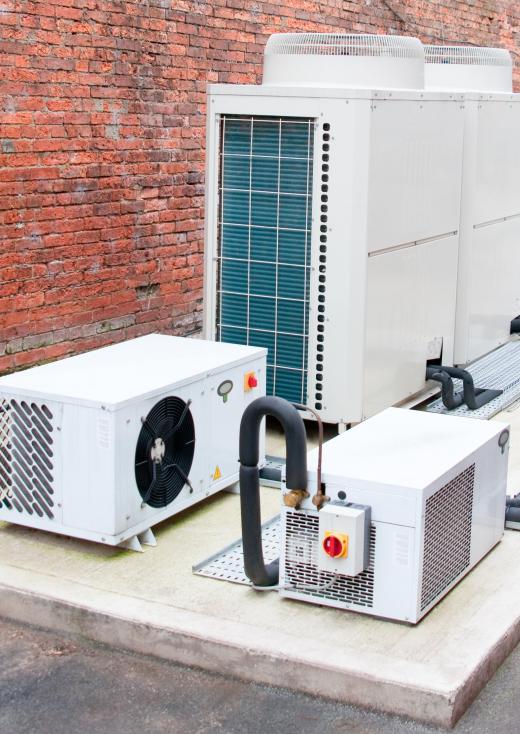A refrigerant scale is a device used for installing and maintaining air conditioning systems. It measures the weight of liquid or gaseous refrigerant as it's added or removed from the unit's compressor. Technicians rely on a refrigerant scale to accurately gauge levels of freon or other refrigerants while charging the system. The scale helps technicians find leaks or simply perform routine maintenance on these systems. Most air conditioning systems require maintenance and testing at least once a year, though heavily-used systems may need more frequent attention.
Properly-maintained cooling systems are vital to both the comfort of building occupants and the longevity of the cooling systems. When too much refrigerant is present, it creates a high-pressure environment within the cooling equipment. Excess strain on the compressor shortens its life and leads to frequent maintenance issues. When too little refrigerant is present, the system is unable to cool the room effectively. Users may keep turning the thermostat down to cool the room, which wastes energy and increases costs without having a significant impact on room temperature.

To use a refrigerant scale, technicians place a refrigerant cylinder on the scale's weighing platform. A series of tubes or cables connect the cylinder to the system, allowing refrigerant to pass between the air conditioner and the cylinder. Based on the weight shown on the scale, the technician either adds or recovers refrigerant to achieve the optimum levels for each particular system. Some refrigerant scale models can be programmed to automatically add or remove a specific amount of refrigerant, while other require manual operation.
A refrigerant scale may be operated using rechargeable battery packs or a power cord, depending on the amount of mobility required by the user. Each scale offers a different weight capacity, with the most expensive units generally capable of holding the largest volume of refrigerant. High-capacity units are required for large-scale commercial systems, while smaller scales can perform effectively for most residential applications. Many of these scales feature a heavy-duty construction to withstand damage from heavy cylinders or other equipment.
Different types of refrigerant scales also offer varying levels of precision. Sensitive systems may require a refrigerant scale with very precise measurements, while very large systems may not require a high level of precision. Some of these scales are built to withstand high temperatures, or to measure refrigerant under high levels of pressure. These heavy-duty devices are generally used in manufacturing or industrial applications to gain accurate measurements under difficult conditions.
